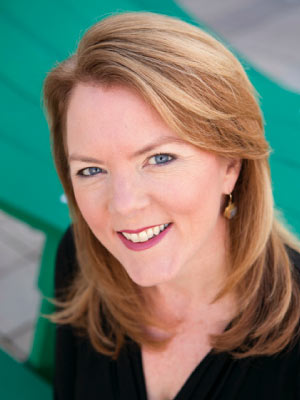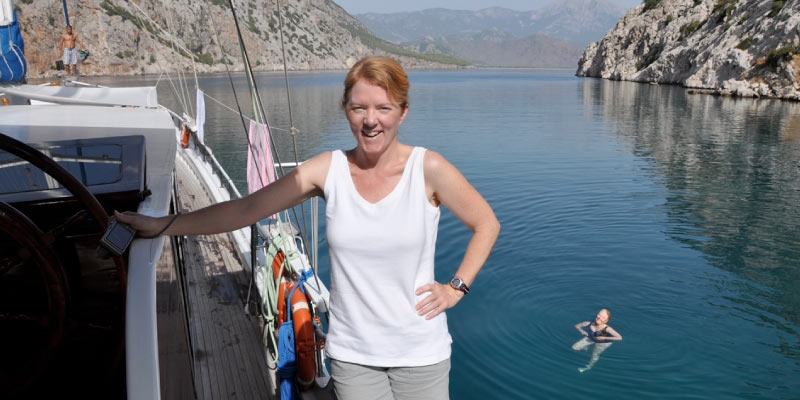
When Martha Goodell sat down in Science Hall for her first class as a Nelson Institute graduate student, she did as any new student would do — chatted with the person sitting next to her. “What do you do?” they asked. It was 2012, and Goodell was starting fresh. An amicable divorce reminded her to do what she loved, which had always been science. Plus, after earning her MBA and working in the business sector for nearly two decades, she had seen some critical gaps in how the business and environmental sectors talk to each other. She wanted to build that bridge.
“I’m in the investment field,” Goodell responded.
“Oh, you’re from the evil side,” her neighbor retorted without missing a beat.
The evil side? Was that how everyone in the Nelson Institute would view her? “That was exactly [this student’s] perspective: business destroyed the environment. We had chemical dumps because of business. We’re in the climate disaster because of business,” Goodell remembers. But where others might see an insult, Goodell saw an opportunity to do exactly what she came to Nelson to do: build bridges.
After earning her MBA in finance from the University of Illinois Urbana-Champaign, Goodell spent the first chapter of her professional career in finance and investments — from organizations like the Bank of America and Ernst & Young to angel investing and running her own consulting firm. In these roles, she started to see the siloed nature of the business sector, particularly when it came to how businesses interacted with the climate crisis and environmental issues. But Goodell rarely sees problems — only opportunities — and became curious about the disconnect.
It was at a cocktail party that Goodell realized her second chapter would be uniting these two spheres. A fellow finance and investments professional whom she was chatting with said she didn’t believe in climate change. Goodell was shocked. She realized, in that moment, that if she went back to school and studied the environment, she could become a translator between finance and the environment.
Perhaps Goodell’s classmate wouldn’t have agreed with her statement: “The climate is only going to be repaired through finance.” But as an expert with a foot in both worlds, Goodell can easily back up such an argument. A few years ago, she sat on a panel about divestments in Wisconsin. “You say you should divest out of oil and gas companies because they’re contributing to the climate crisis,” she explained. “You don’t want to divest from a company like Exxon, you want to actually convince Exxon to use some of that money to invest in other early-stage technologies like climate, water tech, food scarcity, or agriculture You want to have a seat at the table. In addition, you want companies with strong balance sheets so they can diversity risk across their portfolio of projects,” Goodell says.
So at age 45, she turned the page and started researching interdisciplinary environmental graduate programs. She wanted a program that would let her chart her own course, while also allowing for exploration into disciplines beyond straight environmental studies like technology and energy economics. “By the time I had done that research and understood what program I wanted, the only program I applied to was Nelson,” she recalls. It was the energy analysis and policy (EAP) program that first piqued her interest, but she quickly became enamored with all that the Nelson Institute had to offer. In addition to earning her EAP certificate, she also completed the master’s track in environment and resources.
After graduating from UW–Madison, Goodell worked in project finance for climate: “Tire recycling, biofuels, anything that really had a sustainability focus, even if it wasn’t pure climate.” Working in this space, she became interested in direct air capture — a technology that pulls excess carbon out of the air and safely stores it — as a long-term solution to the climate crisis. “The technology required to extract atmosperic CO2 is complex,” Goodell explains. “It’s difficult, but the industry is making progress.” She had found the next negative she could transform into a positive — and it was the perfect space for her finance/environmental bilingual skills.
 Goodell knew that most of the work in direct air capture was based in California, and though she’d settled in the Midwest for about 25 years, she had no reservations about uprooting. As a child, Goodell’s family moved — a lot. Her father was a brass and copper manufacturing executive, so Goodell and her three sisters got used to being the “new kids.” Any former “new kid” knows how tough it can be, but like everything else in Goodell’s life, trial became triumph as she became comfortable in just about any social situation. “You just go out to parties, events. You just don’t think about the fact that it’s awkward, or [wonder] what am I going to do to meet new friends? You just do it,” she says. Goodell started networking with folks in the solar industry which has similar economic drivers to direct air capture, and in late 2022, she linked up with Matt Atwood, the founder and CEO of a company called Aircapture. Just a few months later, she moved to Emeryville, California, and started as Aircapture’s director of strategic finance.
Goodell knew that most of the work in direct air capture was based in California, and though she’d settled in the Midwest for about 25 years, she had no reservations about uprooting. As a child, Goodell’s family moved — a lot. Her father was a brass and copper manufacturing executive, so Goodell and her three sisters got used to being the “new kids.” Any former “new kid” knows how tough it can be, but like everything else in Goodell’s life, trial became triumph as she became comfortable in just about any social situation. “You just go out to parties, events. You just don’t think about the fact that it’s awkward, or [wonder] what am I going to do to meet new friends? You just do it,” she says. Goodell started networking with folks in the solar industry which has similar economic drivers to direct air capture, and in late 2022, she linked up with Matt Atwood, the founder and CEO of a company called Aircapture. Just a few months later, she moved to Emeryville, California, and started as Aircapture’s director of strategic finance.
A start-up, Aircapture is entering its second round of financing — which is where Goodell comes in. Knowing the science of direct air capture and how it can make a difference, paired with understanding the landscape and language of finance, Goodell helps Aircapture tell its story to investors in a meaningful way. “My background is leveraged fairly directly at this stage in the company,” she says. “Investing in any early-stage technology is risky, and direct air capture is complex. So, it takes a lot of science-based storytelling.”
When speaking with investors, Goodell harkens back to the portfolio of initiatives. “Risk” is something that the investment world understands. Each company’s portfolio “is all risk management,” she explains. She translates that understanding of risk into reducing risk to the environment by investing in companies like Aircapture. “You have to look at all these new technologies as portfolios,” Goodell explains. “It’s totally true that one might not work, but finance shows us that if you invest across a diversified portfolio of initiatives, one of those is going to work.”
This understanding of risk carries over into Goodell’s personal life. For her, risk isn’t defined by success or failure, but the loss of opportunity. So when it comes to defining her proudest moments, it’s fitting that she feels the most pride from making decisions that others questioned — like enrolling in the Nelson Institute at age 45. “I’m not even sure where that stuff comes from, you know? Is it the nature versus nurture in life?” she asks herself. “I’m just a scrappy person though. I’m a Taurus, so we just get scrappy,” she says with a smile. “I’m not going to let my past trajectory define my future trajectory.”
Martha Goodell is one of six Nelson Institute alumni award winners. Their stories are featured throughout the Commons magazine and online.